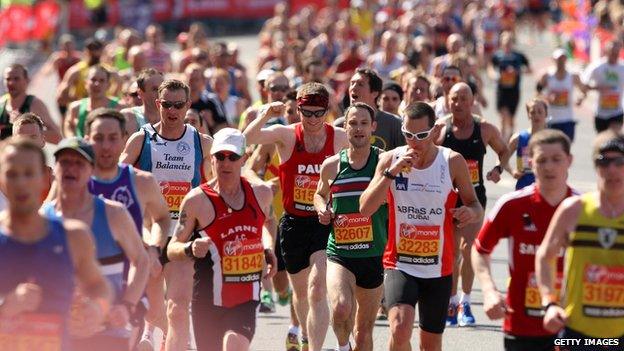Vitamin pills 'lower exercise gains'
- Published

Taking some types of vitamin supplement may make it harder to train for big endurance events like marathons, researchers in Norway suggest.
They said vitamins C and E should be used with caution as they may "blunt" the way muscles respond to exercise.
However, actual athletic performance was not affected in the 11-week trial leading other experts to questions the research.
The findings were published in The Journal of Physiology, external.
The team at the Norwegian School of Sport Sciences in Oslo argued vitamin supplements were readily taken and available, but were unsure if they affected athletic ability.
Over the course of an 11-week trial, the 54 participants were given either 1,000mg of vitamin C plus 235mg vitamin E or a sugar pill. They trained up to four times per week.
Endurance runs
There was no difference in their performance during a Beep test - running faster and faster between two points 20m apart.
However, blood samples and tissue biopsies suggested there were differences developing inside the muscle.
Each muscle cell contains lots of tiny mitochondria which give the muscle cell its energy.
Those taking the supplements seemed to be producing fewer extra mitochondria to cope with the increasing demands placed on the muscle.
Dr Goran Paulsen, one of the researchers, said: "Our results show that vitamin C and E supplements blunted the endurance-training-induced increase of mitochondrial proteins, which are needed to improve muscular endurance.
"Our results indicate that high dosages of vitamin C and E, as commonly found in supplements, should be used with caution, especially if you are undertaking endurance training."
Hmmm
However, Mike Gleeson, a professor of exercise biochemistry at Loughborough University, is not convinced.
He said the biggest factor in performance was how fast the heart and lungs could get oxygen to the muscle, not mitochondria.
Prof Gleeson said the lack of a difference in athletic performance "makes it difficult to interpret".
He told the BBC: "The bottom line is studies show changes in the ability to adapt to exercise could be impaired by high-dose vitamins, but until there are studies showing them affecting athletic performance people shouldn't be worried."
Dr Emma Derbyshire, from the industry-backed Health Supplements Information Service, said some studies had shown a benefit.
"In a four-week randomised controlled trial evaluating vitamin C and E supplementation among female athletes, supplementation reduced markers of oxidative stress compared with a placebo tablet and reduced muscle damage markers associated with aerobic exercise.
"This latest study is essentially preliminary and the research findings would need to be re-assessed in further work.
"Eating as healthy a diet as possible is very important for sports people and athletes. However, if they have a hectic training schedule, particularly for those doing endurance training who are not able to eat as well as they should, a multivitamin and mineral supplement provides a method of ensuring that the intakes of these essential nutrients, including vitamin C and E, follow recommended guidelines."
- Published27 July 2012